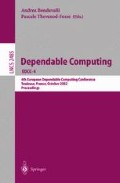Abstract
The complexity of systems and the way they work together will require new approaches for their development and operation, since conventional deterministic approaches may not be sufficient for enabling the provision of services expected from these systems. Several new approaches have emerged recently from different areas, such as, biologically inspired computing, agent technology, and software engineering, just to mention a few. Whether these approaches are able to meet the stringent requirements usually associated with dependable computing is still open to debate. Hence this Panel, which aims to discuss the promises and challenges of novel approaches for dependable computing. Next, in order to set the context of this Panel, some of these approaches are briefly presented.
Access this chapter
Tax calculation will be finalised at checkout
Purchases are for personal use only
References
A. Avizienis. “Toward Systematic Design of Fault-Tolerant Systems”. Computer 30(4). April 1997. pp. 51–58.
L. Andrade, and J. Fiadeiro. “Coordination: the Evolutionary Dimension”. Proceedings TOOLS Europe 2001. Ed. W. Pree. IEEE Computer Society Press, pp. 136–147. 2001.
P. Bentley. Digital Biology: How Nature is transforming our Technology. Headline Book Publishing. London, UK. 2001.
S.-W. Cheng, D. Garlan, B. Schmerl., J. Sousa, B. Spitznagel, and P. Steenkiste. “Using Architectural Style as the Basis for Self-repair”. The Working IEEE/IFIP Conference on Software Architecture 2002. Montreal, Canada. August 2002. (to appear).
L. N. de Castro, and J. I. Timmis. Artificial Immune Systems: A New Computational Intelligence Approach. Springer-Verlag. 2002.
R. de Lemos. “Describing Evolving Dependable Systems using Co-operative Software Architectures”. Proceedings of the IEEE International Conference on Software Maintenance (ICSM’02). Florence, Italy. November 2001. pp. 320–329.
S. Forrest, S. A. Hofmeyr, and A. Somayaji. “Computer Immunology”. Communications of the ACM40(10). 1997. pp. 88–96.
K. Frith, and R. Ellis. “Artificial Intelligence-Genuine Hazards?” Safer Systems: Proceedings of the Fifth Safety-critical Systems Symposium. Brighton, UK. February 1997. Eds. F. Redmill, and T. Anderson. Springer-Verlag. London, UK. pp. 79–95.
Author information
Authors and Affiliations
Editor information
Editors and Affiliations
Rights and permissions
Copyright information
© 2002 Springer-Verlag Berlin Heidelberg
About this paper
Cite this paper
de Lemos, R. (2002). Novel Approaches in Dependable Computing. In: Bondavalli, A., Thevenod-Fosse, P. (eds) Dependable Computing EDCC-4. EDCC 2002. Lecture Notes in Computer Science, vol 2485. Springer, Berlin, Heidelberg. https://doi.org/10.1007/3-540-36080-8_7
Download citation
DOI: https://doi.org/10.1007/3-540-36080-8_7
Published:
Publisher Name: Springer, Berlin, Heidelberg
Print ISBN: 978-3-540-00012-9
Online ISBN: 978-3-540-36080-3
eBook Packages: Springer Book Archive

